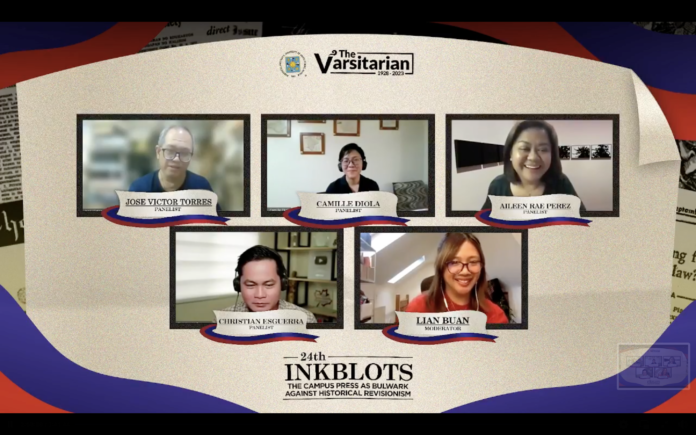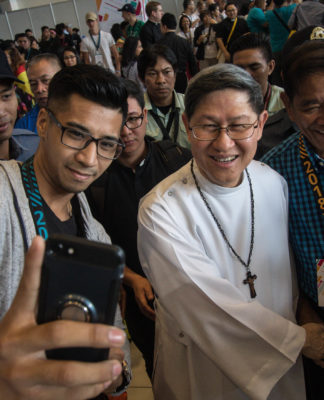COMBATTING historical revisionism in this age of disinformation may seem futile, but campus journalists can make the world a better place one post at a time, a social media expert said on Saturday, Feb. 18.
“As long as there are people who always stand for truth, we can always make the world a better place, one post at a time,” said GMA Integrated News senior social media manager Aileen Rae Perez during the 24th Inkblots, an annual conference of campus journalists organized by the Varsitarian.
Perez, a former Varsitarian sports editor, told more than 300 campus journalists that they are responsible for making information palatable to their constantly evolving audiences.
“This is the perfect time to try new ways of communicating with our audience, and the best way to do it is via social media,” she said. “I’d like to believe that what keeps us relevant is our conscious effort to familiarize ourselves with our audience.”
“‘Yung mga campus journalist ngayon, ‘wag nyo i-kahon ang mga sarili ninyo sa mga naka-sanayan namin… Gamitin niyo ‘yung mga alam niyo, kung ano ‘yung nakaka-aliw o nakaka-entertain sa inyo, kung ano yung masaya para sa inyo, para i-communicate sa mga tao na alam niyong kailagan ng impormasyon na binibigay natin,” she added.
By using these digital strategies, Perez said campus journalists could better counter false information that helped some politicians win the 2022 elections.
According to US-based think tank Rand Corp., the Philippines was targeted by a “firehose of falsehood,” which perpetrators used to shamelessly “disseminate partial truths or outright fictions” during the 2022 elections.
Such falsehoods included whitewashing Martial Law under the late dictator Ferdinand Marcos Sr., the father of President Ferdinand “Bongbong” Marcos Jr., who won the 2022 presidential elections in a landslide.
Tsek.Ph, a fact-check consortium composed of academic institutions, civil organizations, and the media, reported in May 2022 that 92 percent of false information during the campaign period favored Marcos Jr., while 96 percent was detrimental to his biggest opponent, former Vice President Ma. Leonor “Leni” Robredo.
Philstar.com editorial head Camille Diola reminded campus journalists to apply the rigors involved in reporting, such as fact-checking and verification, especially in a fast-moving medium like social media.
“Sometimes you just really have to be a bit more playful. But, at the same time, you know that as a journalist, there is still that rigor that you have to apply in reporting. Don’t forget that rigor whether you’re on social media,” Diola said.
“As long as we apply that method, no matter what method, no matter what format, we can really reshape what journalism is while sticking to the high standards,” she added.
Critical reporting and correcting information involving politics can have ramifications if it affects those in power, said “Facts First” host and UST journalism professor Christian Esguerra.
“’Yung mga reporter na gusto maglabas ng not necessarily negative reporting [but] reports that ask the questions that need to be asked, nag-se-second guess because they know their owners or their news managers might not have their backs,” said Esguerra.
Aside from this, data scientists must take part in combatting disinformation, as existing tools to combat it are not enough, Esguerra said.
Esguerra added that community presses must be given financial support so that local politicians won’t be let off the hook.
“‘Pag naging mahina ‘yung ating community press, imagine how much leeway or latitude certain local officials would have. They’re actually enjoying it now in terms of getting away with so many things,” he warned.
The 24th installment of Inkblots, the Varsitarian’s annual campus journalism fellowship, had the theme “The Campus Press as Bulwark Against Historical Revisionism.” It was conducted virtually for the third straight year due to the Covid-19 pandemic.
Assoc. Prof. Jose Victor Torres, who taught history at UST and is now a faculty member of the De La Salle University history department, delivered the keynote speech about historical revisionism and historical distortion. Rappler reporter Lian Buan moderated the live roundtable discussion.















